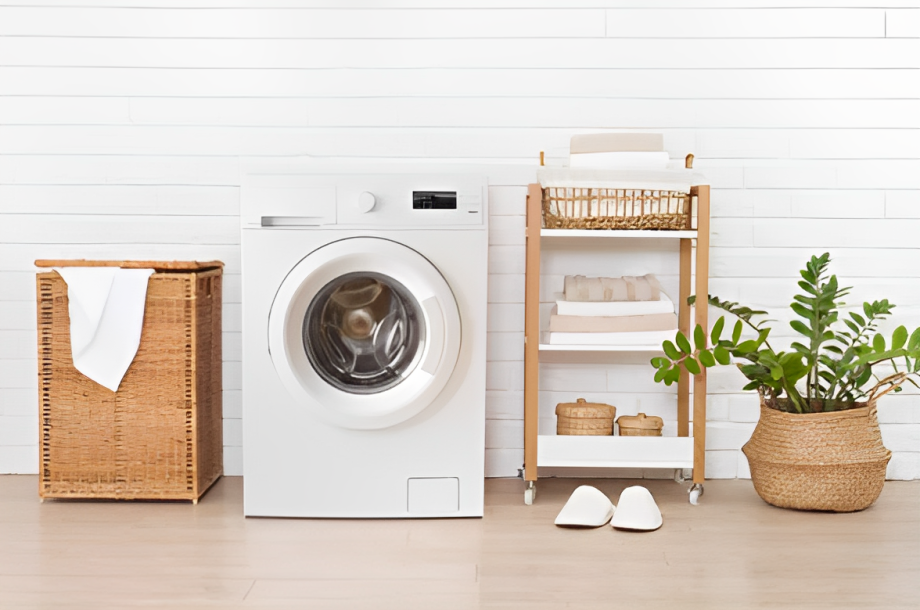
In the modern world, where time is of the essence and convenience is highly valued, the inclusion of a laundry room in a household has become an essential aspect of efficient home management. A laundry room, often overlooked, serves as a hub for maintaining cleanliness and order within a home. This essay delves into the reasons why a laundry area is a necessity, exploring its role in providing convenience, enhancing efficiency, and contributing to overall home organization.
A laundry room serves as a designated space for performing laundry-related tasks, such as washing, drying, and sometimes folding clothes and linens. There are several reasons why having a dedicated laundry area can be beneficial:
1*Convenience and Time-saving:
One of the primary reasons for the indispensability of a laundry area is the convenience it offers. In the absence of a designated space for laundry tasks, individuals are often compelled to resort to inconvenient alternatives such as using communal laundry facilities or visiting laundromats. Such options not only consume valuable time but also disrupt daily routines. A laundry area within the premises of one’s home eliminates the need to travel, allowing residents to manage laundry at their own pace, regardless of weather conditions or external factors.
Furthermore, a laundry room provides the convenience of immediate access to washing and drying facilities. On-site laundering minimizes dirty laundry buildup, prevents storing soiled items, and fosters a cleaner, healthier living space by averting bacterial and allergen growth.
2*Efficiency and Cost-effectiveness:
Efficiency is another compelling reason why a laundry room is essential. When equipped with modern appliances, such as washing machines and dryers, a laundry room optimizes the laundry process. The efficiency gained from these appliances reduces the time spent on washing and drying, enabling individuals to dedicate more time to other productive activities.
From a financial standpoint, a laundry area can be a cost-effective investment. Regular trips to external laundry facilities incur expenses over time, including transportation costs and facility usage fees. In contrast, having a laundry room at home allows residents to save on these recurring costs in the long run. Moreover, the cost of installing and maintaining laundry appliances in a dedicated space is often a one-time expense that pays off over the years.
3*Home Organization and Flexibility:
A laundry room plays a pivotal role in maintaining home organization. The dedicated space prevents the scattering of laundry-related activities throughout the house, contributing to a clutter-free living environment. Clothes hampers, detergents, and other laundry essentials can be conveniently stored in the laundry room, preventing their intrusion into other living areas.
Additionally, a laundry area provides the flexibility to manage laundry on a schedule that aligns with individual routines. This autonomy ensures that laundry tasks do not interfere with daily activities, allowing for better time management and reduced stress. Sorting, washing, drying, and folding can be done without disrupting family life, enhancing the overall harmony within the household.
1-Organization:
A laundry room provides a central and organized space to manage all laundry-related activities. It prevents the scattering of dirty clothes throughout the house and helps keep the laundry process streamlined.
2-Appliance Placement:
Laundry rooms typically house washing machines, dryers, and sometimes other appliances like ironing boards or drying racks. Having these appliances in a separate space prevents clutter and noise in living areas.
3-Efficiency:
Laundry rooms are designed to accommodate the specific needs of laundry tasks, making the process more efficient. They often have built-in storage for laundry supplies, which reduces the need to store these items elsewhere.
4-Utility Connections:
Laundry rooms are equipped with necessary utility connections such as water supply, drainage, and electrical outlets, which are crucial for operating washing machines and dryers.
5-Space Savings:
Concentrating laundry activities in a single room prevents the need to dedicate space in other rooms for laundry tasks. This is especially important in smaller living spaces where optimizing space is essential.
6-Mess and Odor Control:
Laundry rooms contain messes, odors, and potential water spills within a confined area, protecting the rest of the house from potential damage or unpleasant smells.
7-Noise Control:
Washing machines and dryers can be noisy. A laundry room provides a buffer, reducing the noise impact on the rest of the living space.
8-Specialized Activities:
Laundry rooms can be equipped with features like sinks for hand-washing delicate items or treating stains, which might not be available in other parts of the house.
9-Home Value:
Having a dedicated laundry room can add to the overall value of a home, as it’s considered a desirable feature by many potential buyers.
10-Customization:
Homeowners can design and organize the laundry room according to their preferences and needs, optimizing the space for efficient workflow.
Overall, a laundry room offers a convenient and organized space for managing laundry tasks, contributing to a more comfortable and functional living environment.
Frequently Asked Questions about the Importance of a Laundry Room
Q1: Why is having a laundry room at home better than using external laundry facilities?
A1: Having a laundry room at home offers several advantages over using external facilities. It provides immediate access to washing and drying appliances, eliminating the need to travel and wait for machines to become available. This convenience saves time and ensures that laundry tasks can be done on-site, regardless of weather conditions. Additionally, using an on-site laundry area reduces costs associated with transportation and facility usage fees, making it a more cost-effective option in the long run.
Q2: How does a laundry room enhance efficiency in managing household chores?
A2: A laundry room equipped with modern appliances such as washing machines and dryers streamlines the laundry process, saving valuable time and energy. With these appliances readily available, residents can wash and dry clothes, linens, and other items efficiently. This efficiency allows individuals to dedicate more time to other important tasks, contributing to overall home management and productivity.
Q3: What role does a laundry room play in maintaining home organization?
A3: A laundry room is a dedicated space for all laundry-related activities, preventing the scattering of laundry items and tasks throughout the house. By keeping clothes hampers, detergents, and other laundry essentials in one designated area, the rest of the living spaces remain clutter-free and organized. This separation of laundry activities from other areas contributes to a tidier and more visually appealing home environment.
Q4: How does a laundry room contribute to a healthier living atmosphere?
A4: Storing unwashed items, especially damp clothing, can lead to the growth of bacteria, mold, and allergens.With a home laundry room, residents can promptly wash and dry clothes, preventing dirty laundry buildup and promoting a cleaner, healthier living environment.
Q5: Is having a laundry room a one-time investment or an ongoing expense?
A5: Installing a laundry room and equipping it with necessary appliances is typically a one-time investment. Although setting up and buying machines for washing and drying may have upfront costs, these are stable. On the other hand, external laundry facilities bring ongoing expenses like transport and usage fees, making a self-equipped laundry area more economical over time.
Q6: How does a laundry room contribute to family flexibility and time management?
A6: A laundry room provides the flexibility to manage laundry tasks based on individual schedules and preferences. Residents can sort, wash, dry, and fold laundry at times that align with their routines, without disrupting family activities. This autonomy in managing laundry prevents stress and allows for better time management, contributing to a harmonious and balanced family life.
Q7: Can a laundry room contribute to environmental sustainability?
A7: Yes, a laundry room can promote environmental sustainability. Energy-efficient washing and drying appliances can be chosen, reducing water and electricity consumption. Moreover, having control over the laundering process allows individuals to make eco-friendly choices such as using cold water settings and environmentally friendly detergents. By minimizing the use of external laundry facilities, residents also reduce their carbon footprint associated with transportation.
Q8: Is a laundry room equally important for smaller living spaces like apartments?
A8: Yes, a laundry room is equally important for smaller living spaces. In fact, it can be even more valuable in apartments where space is limited. A well-designed laundry area in an apartment can help maximize space utilization while providing the same convenience, efficiency, and organization benefits. It eliminates the need to carry laundry up and down stairs or to a distant facility, making apartment living more comfortable and functional.
Q9: Can a laundry room increase the resale value of a home?
A9: Yes, having a laundry room can positively impact the resale value of a home. Potential buyers often consider the presence of a laundry area to be a valuable asset, as it adds convenience and functionality to the property. A well-equipped and organized laundry area can enhance the overall appeal of the house and make it more attractive to potential buyers, thereby contributing to its market value.
Q10: How can one optimize their laundry room for maximum utility?
A10: To optimize a laundry room’s utility, consider the layout and organization of the space. Invest in high-quality washing and drying appliances that are energy-efficient and suitable for the household’s needs. Use shelving, cabinets, and storage solutions to keep laundry essentials organized and easily accessible. Additionally, consider incorporating folding and ironing spaces to complete the laundry process efficiently. Personalizing the space to fit specific preferences and requirements will ensure the laundry area serves its purpose effectively.
Conclusion:
In conclusion, the inclusion of a laundry room in a household is far more than a mere convenience; it is a fundamental component of modern home management. With its ability to provide convenience, enhance efficiency, and contribute to home organization, a laundry area streamlines the laundry process and improves the overall quality of life for residents. As time remains a precious commodity in contemporary society, the value of a well-equipped and organized laundry area becomes increasingly apparent, solidifying its status as an essential feature of a functional and comfortable home.





